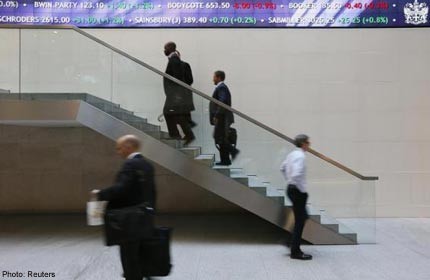Slow start to 2014 for shares, China disappoints

LONDON - World share markets made a soft start to 2014 on Thursday in the wake of disappointing data on Chinese manufacturing, while investors showed renewed appetite for commodities and the dollar as the new year got underway.
Gold grabbed the limelight with a 1.5 per cent jump to $1,220 an ounce, recouping just a little of the losses that made last year its worst in three decades.
The buying spilled over into silver and copper, with dealers talking of demand from Chinese traders looking to pick up commodities on the cheap.
The other action was in the yen, which resumed its long decline on the back of speculation the Bank of Japan will ease policy further while other central banks stay put or begin to rein in the huge amounts of cash being pumped into the economy.
The drop in the yen has been viewed as positive for Japanese exports and corporate earnings, and a major reason its share markets outperformed all others last year.
After China's official Purchasing Managers' Index (PMI) fell to 51.0 in December, manufacturing indices for Europe and the United States will offer more ideas on how global industry was faring into the end of last year.
Figures from the euro zone set a positive early tone as they showed manufacturing growing at the fastest rate since mid-2011 in December on brisk business in Germany and Italy, though a moribund French economy continued to weigh.
"With producers reporting further growth of new orders, exports and backlogs of work, the stage is set for a good start to 2014," said Chris Williamson, chief economist at Markit, which compiles the survey of purchasing managers.
European stocks .FTEU3 had started the year at a 5-1/2 year high, but an initial push higher proved short-lived despite the upbeat data as London's FTSE .FTSE, Paris's CAC 40 .FCHI and Frankfurt's Dax .GDAXI dropped 0.5, 0.6 and 0.5 per cent respectively.
Safe-haven European benchmark German bonds were also out of favour as investors continued to shed them in favour of riskier assets, while the euro sagged to a near one-week low as the dollar .DXY strengthened.
YEN HEADING LOWER
For the major currencies the main theme continued to be weakness in the yen.
The dollar hovered near a five-year high versus the Japanese currency at 105.35 yen, with the focus on whether US data later in the day will support the case for the Federal Reserve gradually scaling back its bond-buying stimulus.
The euro steadied at 144.70 yen, having clocked up gains of 26 per cent over 2013 to reach a five-year peak of 145.67. On the dollar it was down to $1.3733, but still not far from its recent two-year peak of $1.3892.
Dealers suspect the single currency has been supported by the repatriation of funds by European banks and a large and expanding current account surplus in the euro zone.
But there remains a general assumption that rising US Treasury yields will eventually lift the dollar up on the euro.
Yields on US 10-year paper are up at two-and-a-half year highs of 3.03 per cent. Even shorter-dated rates have been rising as improving US economic data justifies the Federal Reserve's decision to start tapering its asset-buying.
Prices of German Bund futures fell to their lowest since September 2013 on Thursday as investors continued to offload the top-rated bonds in favour of riskier assets.
US business and jobless claims data are due later and a speech by outgoing Fed Chairman Ben Bernanke on Friday may offer some more guidance on the central bank's tapering plans.
In oil markets, US crude futures were trading 22 cents higher on Thursday at $98.64 a barrel, while Brent added 20 cents to $111.00.
Having ended last year essentially flat, MSCI's broadest index of Asia-Pacific shares outside Japan .MIAPJ0000PUS fell 0.5 per cent on Thursday.